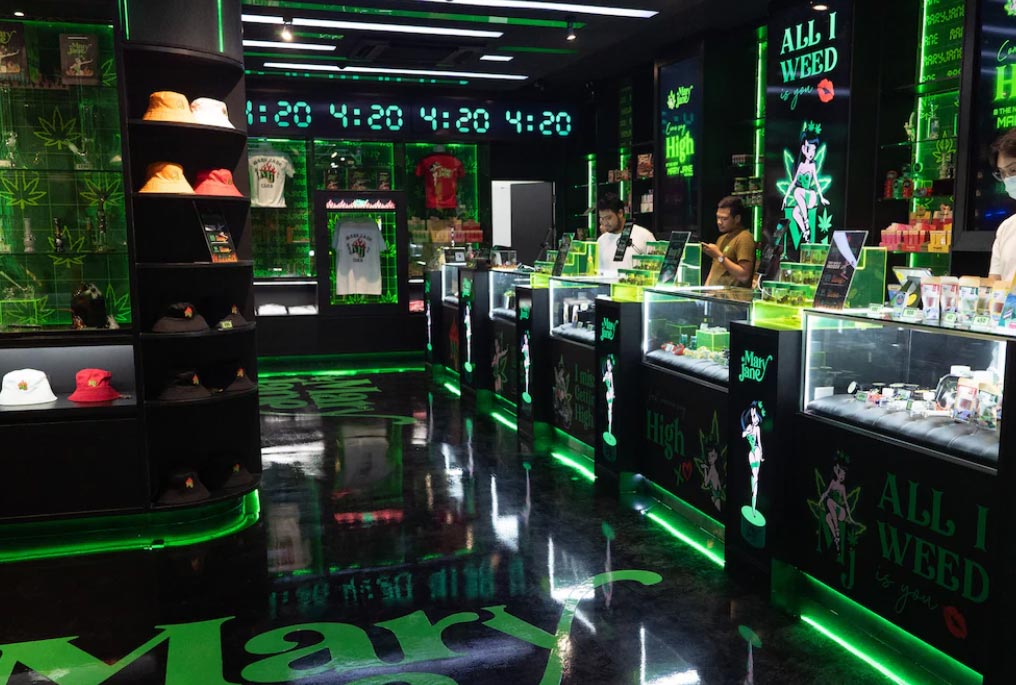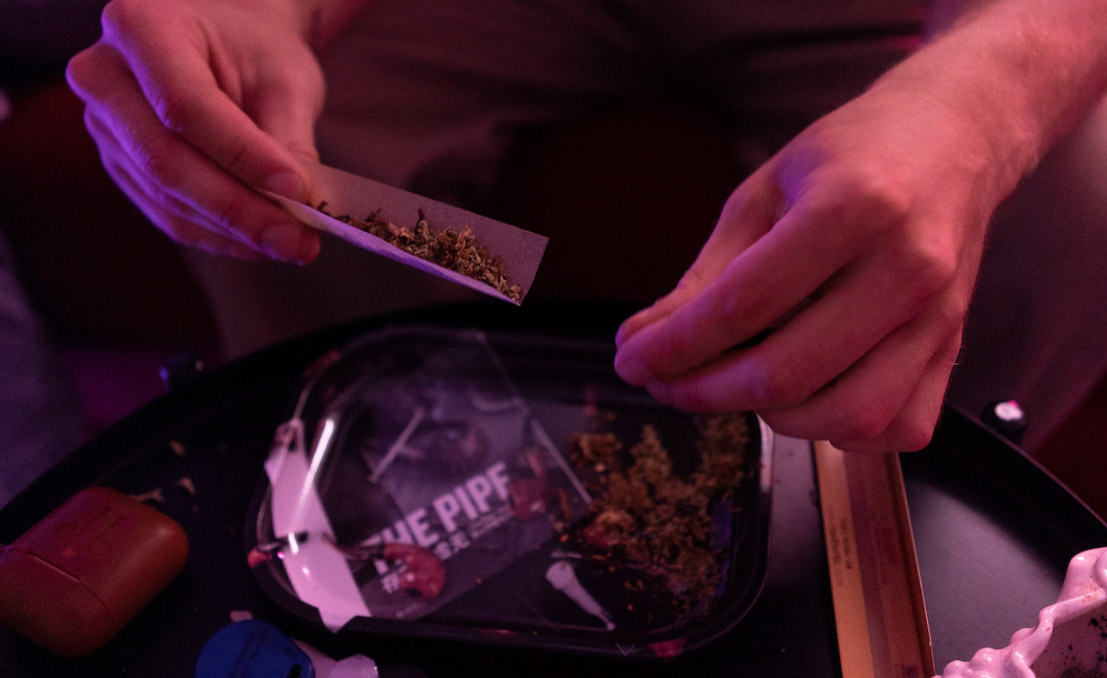 “就像星巴克”,泰国合法大麻场景内幕,我们观察并警惕
“就像星巴克”,泰国合法大麻场景内幕,我们观察并警惕
‘It’s like Starbucks’: Inside Thailand’s legal weed scene
译文简介
健康、文明、和谐的社会没有毒品!
正文翻译

BANGKOK — Tucked away from city traffic in an alley full of massage parlors, office buildings and hotels, the place looks like it could be a cocktail bar. Customers can sit in leather armchairs or claim a high stool at the wooden, L-shaped bar. The shelves, though, are absent of alcohol. In lieu of the typical bottles and glassware, there are bongs, rolling papers, grinders and dramatically lit jars of cannabis flowers like Critical Purple Cush and Amnesia Haze, the most popular strain in the shop.
曼谷——在一个充满按摩院、办公楼和酒店的巷子里,远离城市交通喧嚣,这个地方看起来就像一家鸡尾酒吧。顾客可以坐在皮质扶手椅上,或者在木制的L形吧台上领一张高脚凳。然而,货架上并没有酒。取而代之的是各种烟枪、卷烟纸、碾磨器和引人注目的大麻花罐,装有如Critical Purple Cush和Amnesia Haze,这些是店内最受欢迎的品种。
All The Smoke Lounge is one of the classier places to get high in Bangkok.
All The Smoke Lounge是曼谷最高档的娱乐大麻场所之一。
All The Smoke Lounge是曼谷最高档的娱乐大麻场所之一。
Thousands of weed businesses have opened in Thailand since the country removed the plant from its list of banned narcotics on June 9, 2022, becoming the first country in Asia to decriminalize cannabis. In that short time, entrepreneurs such as All The Smoke owner Rithichai “Mai” Chaisingharn have changed the physical landscape of the kingdom exponentially.
自2022年6月9日泰国将大麻从禁止毒品名单中删除,并成为亚洲首个将大麻合法化的国家以来,泰国已经出现了数千家大麻企业。在这短暂的时间里,像All The Smoke的店主Rithichai “Mai” Chaisingharn这样的企业家已经以指数方式改变了这个王国的自然景观。
自2022年6月9日泰国将大麻从禁止毒品名单中删除,并成为亚洲首个将大麻合法化的国家以来,泰国已经出现了数千家大麻企业。在这短暂的时间里,像All The Smoke的店主Rithichai “Mai” Chaisingharn这样的企业家已经以指数方式改变了这个王国的自然景观。
“Weed went from being something as sinister as heroin to as innocent as a tomato overnight,” said Chaisingharn, 39, a lifelong cannabis smoker who had fantasized about opening a shop akin to a cigar store.
“大麻一夜之间从类似海洛因一样邪恶的东西变成了类似番茄一样无害的东西。”39岁的Chaisingharn说道,他是一位终身大麻吸食者,曾经幻想着开一家类似雪茄店的店铺。
“大麻一夜之间从类似海洛因一样邪恶的东西变成了类似番茄一样无害的东西。”39岁的Chaisingharn说道,他是一位终身大麻吸食者,曾经幻想着开一家类似雪茄店的店铺。
Now there are swanky bars and dinner cruises in Bangkok, and you can find wooden shacks and beachside lounges on tourist-filled beaches. They’ve become so prolific that “it’s like Starbucks,” said Vanessa Dora Lavorato, 36, an edible maker and TV host who visited Thailand in January. “There’s a pot shop on every corner.”
如今,在曼谷有豪华的酒吧和晚餐游船,而在旅游胜地的海滩上,您可以找到木屋和海滩休息室。它们已经变得如此普遍,以至于“就像星巴克一样,”36岁的食品制造商和电视主持人Vanessa Dora Lavorato在一月份访问泰国时说。“每个角落都有一家大麻商店。”
原创翻译:龙腾网 http://www.ltaaa.cn 转载请注明出处
如今,在曼谷有豪华的酒吧和晚餐游船,而在旅游胜地的海滩上,您可以找到木屋和海滩休息室。它们已经变得如此普遍,以至于“就像星巴克一样,”36岁的食品制造商和电视主持人Vanessa Dora Lavorato在一月份访问泰国时说。“每个角落都有一家大麻商店。”
原创翻译:龙腾网 http://www.ltaaa.cn 转载请注明出处
Travelers can get a 90-minute cannabis-themed massage treatment, complete with a soak in an infused bath, at Anantara resorts, or book half-day tours of cannabis farms. In Bangkok, the cannabis tour company Budler (pronounced like “butler) is getting off the ground, taking customers to dispensaries, cultural sites and places to eat.
游客可以享受90分钟的大麻主题按摩疗程,在Anantara度假村里泡在注入大麻的浴缸中,或者预订大麻农场的半日游。在曼谷,大麻旅游公司Budler(发音类似“管家”)正在起步,带顾客去大麻店、文化景点和餐厅。
游客可以享受90分钟的大麻主题按摩疗程,在Anantara度假村里泡在注入大麻的浴缸中,或者预订大麻农场的半日游。在曼谷,大麻旅游公司Budler(发音类似“管家”)正在起步,带顾客去大麻店、文化景点和餐厅。
It’s a far cry from the country’s previous stance on weed, and where the drug stands in the rest of the region.
这与该国之前对大麻的立场,以及该药物在该地区其他部分的地位大相径庭。
这与该国之前对大麻的立场,以及该药物在该地区其他部分的地位大相径庭。
“Southeast Asia in general has always been really very strict [on drugs],” said Bangkok-based author Joe Cummings, who wrote the first Lonely Planet guidebook for Thailand.
“总的来说,东南亚一直非常严格[对毒品],”居住在曼谷的作家Joe Cummings说,他曾为泰国撰写了第一本《孤独星球》旅行指南。
“总的来说,东南亚一直非常严格[对毒品],”居住在曼谷的作家Joe Cummings说,他曾为泰国撰写了第一本《孤独星球》旅行指南。
----------------------------------------

Scaling back the ‘war on drugs’
缩减“禁毒战争”

Scaling back the ‘war on drugs’
缩减“禁毒战争”
Before Thailand criminalized cannabis in 1935, the plant had been a standard composition of cooking and medicine. Cummings said there was a laissez-faire attitude toward cannabis when he lived in the country in the ’70s and ’80s, even after the country reinforced its narcotics laws in 1979.
在泰国于1935年将大麻定为非法之前,该植物一直是烹饪和医药的标准成分。Cummings表示,在他70年代和80年代居住在泰国时,对待大麻的态度非常宽松,即使在1979年该国加强了禁毒法律。
在泰国于1935年将大麻定为非法之前,该植物一直是烹饪和医药的标准成分。Cummings表示,在他70年代和80年代居住在泰国时,对待大麻的态度非常宽松,即使在1979年该国加强了禁毒法律。
“It was common to see it in little restaurants, especially boat noodle restaurants,” he said. “And you could go down to a dock or any kind of pier, and the fishermen would be smoking openly.”
“在小餐馆里很常见,尤其是船面店,”他说。“你可以走到码头或任何类型的码头,渔民们会公开吸大麻。”
“在小餐馆里很常见,尤其是船面店,”他说。“你可以走到码头或任何类型的码头,渔民们会公开吸大麻。”
Over time, the government grew more serious about its “war on drugs,” setting fire to millions of dollars’ worth of marijuana on the International Day Against Drug Abuse and Illicit Trafficking. Weed wasn’t as widely available, but it was easy enough to find in backpacker hot spots or red-light districts. Arrests for recreational use were common and could lead to fines.
随着时间的推移,政府对其“禁毒战争”越来越重视,每年在国际禁毒和禁止非法贩运日点燃价值数百万美元的大麻。大麻当时并没有那么普遍,但在背包客热点地区或红灯区还是很容易找到。因娱乐性使用而被逮捕是常见的,并可能导致罚款。
随着时间的推移,政府对其“禁毒战争”越来越重视,每年在国际禁毒和禁止非法贩运日点燃价值数百万美元的大麻。大麻当时并没有那么普遍,但在背包客热点地区或红灯区还是很容易找到。因娱乐性使用而被逮捕是常见的,并可能导致罚款。
But, Cummings said, punishments for possession weren’t as severe as in neighboring countries such as Malaysia, Singapore, Indonesia and Myanmar.
但是,Cummings说,对持有毒品的惩罚没有马来西亚、新加坡、印度尼西亚和缅甸等邻国那么严厉。
但是,Cummings说,对持有毒品的惩罚没有马来西亚、新加坡、印度尼西亚和缅甸等邻国那么严厉。
The laws are even lighter today. And after the government removed the plant from its list of banned narcotics, more than 4,200 people incarcerated for alleged marijuana crimes became eligible for release.
如今,法律甚至更加宽松了。在政府将大麻从禁毒名单中删除后,超过4,200名因涉嫌大麻犯罪而被监禁的人有资格获释。
如今,法律甚至更加宽松了。在政府将大麻从禁毒名单中删除后,超过4,200名因涉嫌大麻犯罪而被监禁的人有资格获释。
----------------------------------------
Weed’s wide reach
大麻的广泛影响
Weed’s wide reach
大麻的广泛影响
On her latest trip to sleepy Naiyang Beach, less than two miles from Phuket International Airport, Marissa Caluzzi found familiar golden sand, street food carts and whistling pine trees. But something dank was in the air.
在她最近一次前往宁静的奈扬海滩的旅行中,那儿距离普吉国际机场不到两英里,Marissa Caluzzi发现了熟悉的金色沙滩、街头小吃推车和风吹呼啸的松树。但空气中弥漫着大麻气味。
在她最近一次前往宁静的奈扬海滩的旅行中,那儿距离普吉国际机场不到两英里,Marissa Caluzzi发现了熟悉的金色沙滩、街头小吃推车和风吹呼啸的松树。但空气中弥漫着大麻气味。
“You can smell it,” said Caluzzi, 56, who has been coming to Naiyang Beach from Australia for decades. “People sit on their balconies and smoke and just come out on the beach and smoke.”
“你可以闻到它,”现年56岁的Caluzzi说道,她数十年来一直从澳大利亚来到奈扬海滩。“人们坐在他们的阳台上吸大麻,或者出来到海滩上吸大麻。”
“你可以闻到它,”现年56岁的Caluzzi说道,她数十年来一直从澳大利亚来到奈扬海滩。“人们坐在他们的阳台上吸大麻,或者出来到海滩上吸大麻。”
Smoking in public is technically illegal, punishable by a public nuisance fine of $780 or a potential three-month sentence. In April, Thailand’s Department of Health warned that enforcement of the rule would become more strict.
在公共场所吸大麻从法律上来说是违法的,可处以780美元的公共滋扰罚款或可能面临三个月的监禁。今年四月,泰国卫生部警告称该规定的执行将变得更加严格。
在公共场所吸大麻从法律上来说是违法的,可处以780美元的公共滋扰罚款或可能面临三个月的监禁。今年四月,泰国卫生部警告称该规定的执行将变得更加严格。
Cannabis products with over 0.2 percent THC are illegal in Thailand. (Most U.S. states with legalized cannabis don’t have a cap on potency.) Otherwise, anyone can now buy and consume weed if they’re over 20 years old, and not pregnant or breastfeeding. People can even take marijuana on planes for domestic flights.
在泰国,含有超过0.2%四氢大麻酚的大麻产品是非法的。(美国大多数大麻合法化的州都没有大麻效力上限。)除此以外,任何年满20岁、非孕妇或哺乳期的人现在都可以购买和消费大麻。人们甚至可以在国内航班上携带大麻。
原创翻译:龙腾网 http://www.ltaaa.cn 转载请注明出处
在泰国,含有超过0.2%四氢大麻酚的大麻产品是非法的。(美国大多数大麻合法化的州都没有大麻效力上限。)除此以外,任何年满20岁、非孕妇或哺乳期的人现在都可以购买和消费大麻。人们甚至可以在国内航班上携带大麻。
原创翻译:龙腾网 http://www.ltaaa.cn 转载请注明出处
“I think it is good for tourism,” said Prawit “Wit” Chankasem, 39, who has been a tour guide in Bangkok for 13 years. Weed has become a huge presence not only in tourist areas and big cities, but also in local areas where it is uncommon to see visitors or expats. “I went to some small villages in Thailand and was like, ‘Wow, you have cannabis shops here,’” Chankasem said.
“我认为这对旅游业有好处,”现年39岁的Prawit “Wit” Chankasem说道,他在曼谷担任导游已有13年。大麻不仅在旅游区和大城市中占据了重要地位,而且在一些很少见到游客或外籍人士的当地地区也非常普遍。“我去过泰国的一些小村庄,就像‘哇,你们这里也有大麻店’,”Chankasem说。
“我认为这对旅游业有好处,”现年39岁的Prawit “Wit” Chankasem说道,他在曼谷担任导游已有13年。大麻不仅在旅游区和大城市中占据了重要地位,而且在一些很少见到游客或外籍人士的当地地区也非常普遍。“我去过泰国的一些小村庄,就像‘哇,你们这里也有大麻店’,”Chankasem说。
Chankasem, like some Thai people, is worried that the wide availability of the drug could put children at risk. That concern is at the center of emerging efforts to reclassify the plant as a narcotic, arguing that recreational use is bad for the country.
像一些泰国人一样,Chankasem担心该药物广泛的可获得性可能会对儿童构成风险。这一担忧是新兴努力的核心,旨在重新将该植物归类为毒品,并认为娱乐性使用对国家不利。
像一些泰国人一样,Chankasem担心该药物广泛的可获得性可能会对儿童构成风险。这一担忧是新兴努力的核心,旨在重新将该植物归类为毒品,并认为娱乐性使用对国家不利。
“They think I’m selling something that’s killing society,” All The Smoke’s Chaisingharn said of his critics.
“他们认为我在销售杀死社会的东西,”All The Smoke的Chaisingharn对他的批评者如此说道。
“他们认为我在销售杀死社会的东西,”All The Smoke的Chaisingharn对他的批评者如此说道。
----------------------------------------
Opportunity for agriculture
农业的机遇
Opportunity for agriculture
农业的机遇
Cummings said demand for cannabis across the country is so high “that even with hundreds and thousands of acres devoted to cultivation, right now there’s still a shortage,” he said. In the six months since All The Smoke opened, Chaisingharn said, seven more weed shops cropped up nearby.
Cummings称泰国全国对大麻的需求如此之高,“即使有数百甚至数千英亩用于种植,现在仍然存在短缺。”他说。自All The Smoke开业以来的六个月里,Chaisingharn说,附近又出现了七家大麻店。
Cummings称泰国全国对大麻的需求如此之高,“即使有数百甚至数千英亩用于种植,现在仍然存在短缺。”他说。自All The Smoke开业以来的六个月里,Chaisingharn说,附近又出现了七家大麻店。
That’s good news for people like Cha “Ice” Na, 33, a new cannabis farmer in Rayong, an eastern province on the Gulf of Thailand. After suffering from a motorbike accident before the pandemic, Na turned to medical marijuana for pain relief. (Thailand has had legalized medical marijuana since 2018.)
这对像Cha “Ice” Na这样的人来说是个好消息,33岁,他是泰国湾东部省份拉廊的一位新大麻种植者。在疫情爆发前,Na曾遭遇摩托车事故,并转而使用医用大麻缓解疼痛。(泰国自2018年以来已合法化医用大麻。)
这对像Cha “Ice” Na这样的人来说是个好消息,33岁,他是泰国湾东部省份拉廊的一位新大麻种植者。在疫情爆发前,Na曾遭遇摩托车事故,并转而使用医用大麻缓解疼痛。(泰国自2018年以来已合法化医用大麻。)
Once he had recovered from his horrific wounds, Na felt so passionate about marijuana’s capacity to heal that he started growing plants himself. He now has three large rooms and an outdoor farm where he grows Wild Thai, which is considered a rare sativa strain of cannabis. Every month, he drives into Phuket to deliver it to Skushi, a new shop in Old Town that caters to tourists.
在从可怕的伤痛中康复后,Na对大麻的疗愈能力充满了热情,于是他开始自己种植该植物。他现在有三个大房间和一个户外农场,在那里种植野生泰国大麻,这被认为是一种罕见的大麻品种。每个月,他驱车前往普吉岛,将大麻交付给位于老城区的一家名为Skushi的新商店,该商店专门为游客提供服务。
原创翻译:龙腾网 http://www.ltaaa.cn 转载请注明出处
在从可怕的伤痛中康复后,Na对大麻的疗愈能力充满了热情,于是他开始自己种植该植物。他现在有三个大房间和一个户外农场,在那里种植野生泰国大麻,这被认为是一种罕见的大麻品种。每个月,他驱车前往普吉岛,将大麻交付给位于老城区的一家名为Skushi的新商店,该商店专门为游客提供服务。
原创翻译:龙腾网 http://www.ltaaa.cn 转载请注明出处
Farming cannabis won’t make him rich, particularly as the industry struggles with smuggled imports, but Na says it pays enough to support him, his wife, “Apple,” and their baby. He also thinks it will inspire repeat visits from tourists.
种植大麻不会让他致富,尤其是在行业面临走私进口的困境下,但Na表示它足够维持他、他的妻子“Apple”和他们的孩子的生活。他还认为这将激发游客再次光顾的动力。
种植大麻不会让他致富,尤其是在行业面临走私进口的困境下,但Na表示它足够维持他、他的妻子“Apple”和他们的孩子的生活。他还认为这将激发游客再次光顾的动力。
“People come to Thailand to eat good food … see beautiful scenery … relax,” he said. Cannabis enhances that atmosphere. “They’ll come back.”
“人们来泰国是为了品尝美食...欣赏美丽的风景...放松身心,”他说。大麻增强了这种氛围。“他们会再次回来。”
原创翻译:龙腾网 http://www.ltaaa.cn 转载请注明出处
“人们来泰国是为了品尝美食...欣赏美丽的风景...放松身心,”他说。大麻增强了这种氛围。“他们会再次回来。”
原创翻译:龙腾网 http://www.ltaaa.cn 转载请注明出处
评论翻译
无
很赞 ( 3 )
收藏